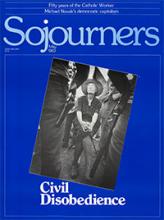Civil disobedience as a political tactic is of relatively recent genesis, but resistance to human sovereigns is as old as civilization itself. In the ancient world this resistance usually took the forms of refusal to abide by the decrees of a king or a prophetic challenge to the legitimacy of a ruler's authority. Such disobedience was a serious undertaking.
Although democratic dissent and free speech were not unknown, the normal paradigm of political rule was that of the sovereign's absolute authority. Since the king was divine in the ancient Mediterranean world, disobedience meant transgressing the very order of the cosmos. The radical monotheism of the Bible—the belief that only God was sovereign—therefore accepts acts of resistance to ruling political authority as part of the fabric of the salvation history of Yahweh.
In surveying the biblical material for light on an essentially modern way of posing the question (civil disobedience), we must define what it is we are looking for. We are not, on the one hand, looking for a "doctrine of the state," though this impinges on the topic; nor are we, on the other hand, cataloguing every form of subversive political action in the Bible. Rather, we are looking for biblical antecedents to our modern experimentation with civil disobedience. Thus, the focus is on instances of open and nonviolent acts of resistance to the structures of authority in a given biblical social formation.
Read the Full Article

